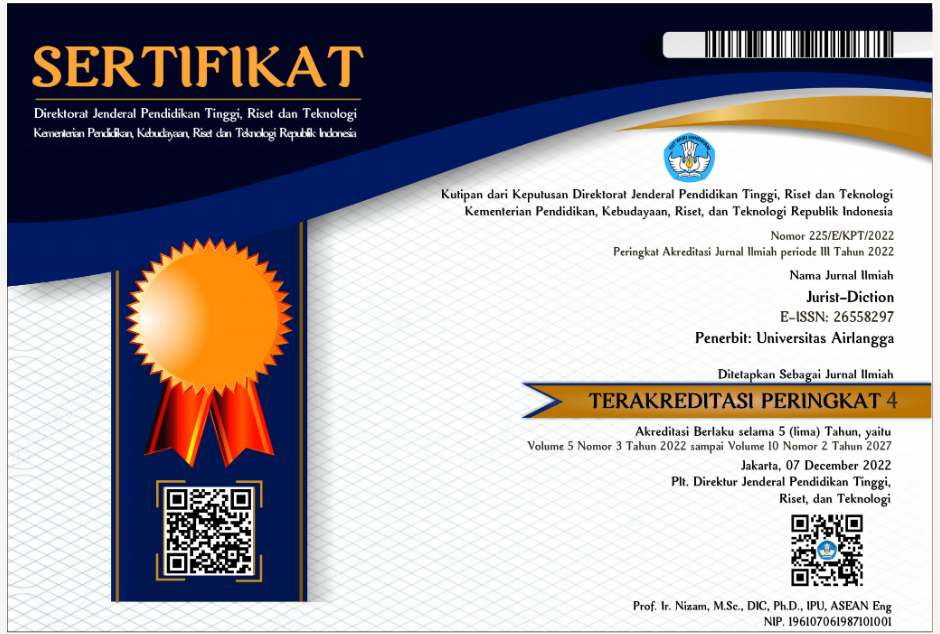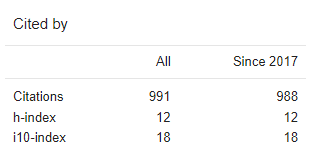Tinjauan Yuridis Cyber Espionage Berdasarkan Hukum Internasional
Downloads
Abstract
Due to the rapid transformation of technology causing a subliminal changes on how states spy upon each other. With the help of technology and cyber infrastructure, states tend to use cyber technology as its main facility to conduct an espionage towards other states. Cyber espionage has come to represent national security and economic threat, due to all the classified information that already been massively stolen by another country. The aim of this research paper is to analyze and clarify pertaining the role of International law specifically towards this kind of act of espionage, and perceive the state responsibility of perpetrator which is states. It can be concluded that cyber espionage does not per se regulated under international law, but its lawfulness depends on the way in which it operation carried out may violate specific international conventions or any other international law principles.
Keywords: Cyberlaw; Cyber Espionage; International Law.
Abstrak
Pesatnya perkembangan teknologi dan digitalisasi mengakibatkan terjadinya perubahan metode dan cara dalam pelaksanaan tindakan spionase oleh negara terhadap negara lain guna mengumpulkan fakta dan informasi yang berkaitan dengan perkembangan politik, ekonomi, teknologi, dll melalui kapabilitas teknologi siber atau kerap disebut sebagai cyber espionage. Tujuan dari penelitian ini adalah untuk menganalisis terkait peranan hukum internasional dalam mengatur tindakan tersebut dalam tataran internasional dan bagaimana pertanggungjawaban dari negara pelaku tindakan cyber espionage. Hasil dari penelitian ini menyimpulkan bahwa belum ada konvensi international khusus yang mengatur mengenai cyber espionage sehingga tindakan cyber espionage itu sendiri merupakan tindakan yang masih belum diatur secara international.
Kata Kunci: Hukum Siber; Cyber Espionage; Hukum Internasional.
Buku
Aaron Shull, Cyber Espionage and International Law (GigaNet 2013).
Asril Sitompul, Hukum Internet; Pengenalan Mengenai Masalah Hukum di Cyberspace (Citra Aditya Bakti 2001).
Bert-Jaap Koops, Cybercrime and Jurisdiction (Information Technology & Series, Chapter 2006).
CCDOE, Tallin Manual on the International Law Applicable to Cyber Warfare (CyCon 2013).
Dikdik M, Cyber Law: Aspek Hukum Teknologi Informasi (Refika Aditama 2005).
Francois Delerue, Cyber Operations and International Law (Cambridge Studies in International and Comparative Law 2020).
J.G. Starke, Pengantar Hukum Internasional (Sinar Grafika 2008).
J.L Brierly, Hukum Bangsa-bangsa: Suatu Pengantar Hukum Internasional, (Bhratara 1963).
Malcolm D Evans, International law, Second Edition (Oxford University Press 1998).
Rushkoff Douglas, Cyberia: ‘Life in the Trenches of Cyberspace (Clinamen Press Ltd 1994).
Jurnal
Baker D., Christopher,‘Tolerance of International Espionage: A Functional Approach'(2003) Vol. 19 Issue 5 American University International Law Review.
Geoffrey B Demarest, Lt. Col, ‘Espionage in International law' (1991) Denver Journal of International law and Policy.
Gerald Postema, ‘Utilitarian International Order: Bentham on International Law and International Order' (2008) University of North Carolina at Chapel Hill.
Joanna Kulesza, ‘State Responsibility for cyber-attacks on international peace and security' (2009) XXIX Polish Yearbook of International Law.
Katharina Ziolkowski, ‘Peacetime Regime for State Activities in Cyberspace', International Law (2013) International Relations and Diplomacy, NATO CCD OE Publication.
Marco Mayer, ‘International Politics in the Digital Age: Power Diffusion or Power Concentration (2013) XXV International Relations Sections University of Florence.
Masitoh Indriani, ‘Implementasi Peraturan Pemerintah Nomor 82 Tahun 2012 Sebagai Upaya Negara Mencegah Cybercrime Dalam Sistem Transaksi Elektronik' (2014) 29 no 3 Yuridika.
Maziar Jamnejad,'The Principle of Non-Intervention' (2009) Leiden Journal of International Law.
Nurul Wakhidah, ‘Prinsip Non-Intervensi ASEAN dalam Upaya Penyelesaian Konflik Rohingnya di Myanmar, (2014) Peace and Conflict Studies FISIPOL UGM.
Pratiwi Esty, ‘Hukum Siber : Praktik Spionase Dalam Kedaulatan Negara dan Hubungan Diplomasi Berdasarkan Ketentuan Hukum Internasional' (2020) Vol.8 No.3 Jurnal Pendidikan Kewarganegaraan Undiksha.
Russel Buchan, ‘Cyber Espionage and International Law' (2019) Hart Publishing, Oxford.
S. Lin, Herbert, "Offensive Cyber Operations and the Use of Force”, (2010) National Research Council (NRC) of the National Academies, Vol.4:63.
Schmitt, Michael N., Tallin Manual 0 International Applicable to Cyberwarfare' (2013) Cambridge University Press.
Stoddart, Kristan, ‘UK Cyber Security and Critical National Infrastructure Protection' (2016) 92 5 International Affairs.
Tamas Hoffmann, ‘Dr. Opinio Juris and Mr. State Practice: The Strange Case of Customary International Humanitarian Law' (2006) Department of International Law.
Veronika Prochko, ‘The International Legal View of Espionage' (2018) E-International Relations.
Wallace, David, ‘Peeling Back the Onion of Cyber Espionage after Tallin 2.0', (2019) Maryland Review Volume 78 Issue 2 Article 2.
Laman
ABC News, "George Brandis briefed by ASIO on Claims China stole classified blueprints of Canberra” dikunjungi pada tanggal 2 Juli 2021.
Alexander Abad-Santos, "China is Winning the Cyber War Because They Hacked U.S. Plans for Real War”, , dikunjungi pada tanggal 28 Maret 2013.
Christopher Bing, "U.S. cybersecurity experts see recent spike in Chinese digital espionage”, , dikunjungi pada tanggal 27 Maret 2021.
Fireeye, "Suspected Chinese Cyber Espionage Group (Temp.Periscope) Targeting U.S. Engineering and Maritime Industries, , diakses pada tanggal 3 Juli 2021.
Kenneth Rapoza, "U.S. Hacked China Universities, Mobile Phones, Snowden tells China Press”, dikunjungi pada 3 Juli 2021.
Navarette Inaki, Why Silence Isn't Always Golden: Espionage Exceptions under Customary International Law, dikunjungi pada tanggal 16 Maret 2021.
Andy Greenberg,' Meet the Mad Scientist Who Wrote the Book on How to Hunt Hackers,' dikunjungi pada tanggal 17 Januari 2021.
Arifiyadi Teguh, "Dunia Siber yang Tidak Maya”, dikunjungi pada 28 November 2020.
DSLA, "Cyber Law: Pengertian dan Tujuan Cyber Law di Indonesia” dikunjungi pada tanggal 25 Desember 2020.
Konvensi Internasional
Hague Convention IV With Respect to the Laws and Customs of War on Land Articles on State Responsibility of States for Internationally Wrongful Acts (ARSIWA) 2001.
Council of Europe, Convention on Cybercrime (Budapest 2001).
Declaration on the Inadmissibility of Intervention and Interference in the Internal Affairs of States.
Friendly Declaration 1970.
Montevido Convention on the Rights and Duties of States 1933.
Piagam PBB (UN Charter).
The Antartic Treaty 1959.
Treaty on Principles Governing the Activities of States in the Exploration and Use of Outer space.
United Nations Conventions on the Law of the Sea.
Vienna Convention on Diplomatic Relations1961.
Vienna Convetion on Consular Relations 1963.
Putusan
Corfu Channel Case, United Kingdom of Great Britain and Northern Ireland v. People's Republic of Albania, Assessment of Compensation, 15 XII 49, International Court of Justice (ICJ), 15 Desember 1949.
Military and Paramilitary Activities in and Against Nicaragua, Nicaragua v. United States, Merits, Judgment, (1986) ICJ Rep 14, ICGJ 112.
Prosecutor v. Dusko Tadic (Appeal Judgement), IT-94-1-A, International Criminal Tribunal for the Former Yugoslavia (ICTY), 15 Juli 1999.
S.S. ‘Lotus”, France v Turkey, Judgment No. 9, PCIJ Series A no 10, ICGJ 248 (PCIJ 1927).
Jurist-Diction (P-ISSN 2721-8392, E-ISSN 2655-8297), published by Universitas Airlangga, is licensed under the Creative Commons Attribution 4.0 International License (CC BY 4.0).
This license permits users to:
- Share – copy and redistribute the material in any medium or format;
- Adapt – remix, transform, and build upon the material for any purpose, including commercial use.
These freedoms are granted under the following conditions:
Attribution – You must provide appropriate credit, include a link to the license, and indicate if any changes were made. This may be done in any reasonable manner, but not in a way that suggests the licensor endorses you or your use.
No additional restrictions – You may not apply legal terms or technological measures that restrict others from exercising the rights granted under the license.
Note: As of Volume 5, No. 1 (2022), Jurist-Diction has adopted the Creative Commons Attribution 4.0 International License (CC BY 4.0), replacing its previous license (CC BY-NC-SA).


















